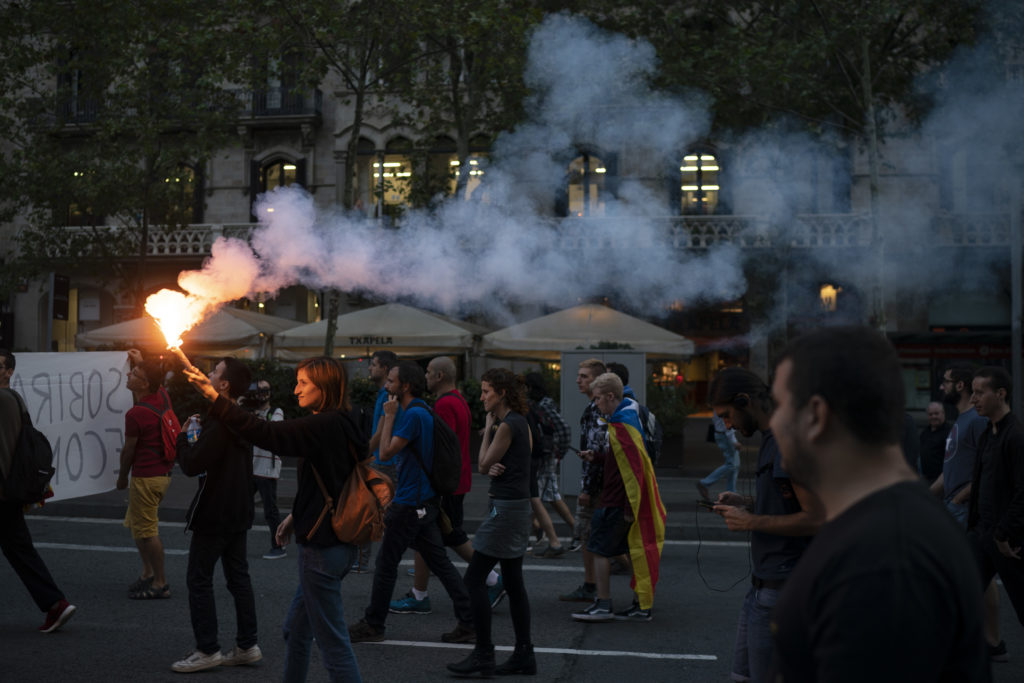
Pro-secession activists in Spain’s Catalonia region blocked major transportation routes and thousands of students marched in Barcelona on the anniversary Monday of an independence referendum that was crushed by police and failed to produce a separate Catalan state.
College and high school boycotted classes and made emotional speeches at mass demonstrations to commemorate the Oct. 1, 2017, vote that Spanish courts had deemed illegal and ordered suspended.
The anniversary of the event that sparked Spain’s gravest political crisis in decades was being marked by a fractured Catalan independence movement amid a timid dialogue with the central government, now in the hands of a minority Socialist administration.
In Girona, north of Barcelona, hundreds of activists halted high-speed railway traffic for most of the morning by occupying the train tracks. Some protesters then moved to the local headquarters of the Catalan government’s provincial delegation, replacing the official Spanish flag from the public building with a separatist emblem.
Local activist groups that emerged after last year’s independence declaration, known as Committees for the Defense of the Republic, shared photos and posts on social media showing blockages of regional roads and several points along the AP-7 highway, the main north-south artery running through eastern Catalonia and leading to the French border.
Traffic was affected in Lleida and Barcelona, the regional capital, where marches were held throughout the day. At midday, thousands of students walked behind a street-wide banner that read, “We won’t forget, neither will we forgive.”
They shouted “Freedom for political prisoners,” a reference to the separatist leaders who have been in pre-trial custody on rebellion and other charges for nearly a year.
Maria Vila, a protester who was placing “Republic under construction” stickers in Barcelona’s main thoroughfare, said she wanted to highlight last year’s violence and demand more progress on secession.
“The Catalan government has not done much and we are determined to make the Catalan Republic happen, in any way we can, even if it is by holding another referendum, a legal one,” she told The Associated Press.
Meanwhile, members of the regional government and other top authorities returned to Sant Julia de Ramis, the northern town that has become a symbolic place for Catalan separatists because one year ago police stormed into the local school to prevent people from voting.
Carles Puigdemont, Catalonia’s president at the time, had been scheduled to vote there but had to find an alternative polling station when anti-riot police broke the gates of the school to confiscate ballot boxes and used batons to disperse and injure voters refusing to leave.
The incidents were broadcast live and brought pressure on the Spanish central government, at the time in the hands of conservatives. Separatists claimed a victory for independence in the vote despite its illegal nature, the police violence and a lack of oversight.
In a brief speech Monday, Catalonia’s current president, Quim Torra, called on supporters gathered outside of the Sant Julia de Ramis school to remember the lessons of the referendum and to press ahead with efforts to secede from Spain.
He spoke while some people held a banner behind him reading, in Catalan, “People demand, the government obeys,” a message that could be aimed at the Spanish government that says the country’s constitution doesn’t allow a referendum on a region’s secession, but also at regional separatist politicians who have been criticized for not delivering on the promise of independence.
Torra was hand-picked by Puigdemont from Belgium, where the separatist leader successfully fought off extradition and has been advocating for an independent Catalonia. On Monday, he released a video on Twitter calling on Catalans to remain united in persevering with the goal of breaking away from Spain.
“Let us not stray from the only possible way to live in a full democracy: the (Catalan) Republic and its international recognition,” Puigdemont said.
Torra has asked the government of Prime Minister Pedro Sanchez to authorize a binding vote on secession, and also to release the nine separatist leaders that are in pre-trial detention on rebellion and other charges.
Dialogue between the regional and national administrations has so far delivered some economic deals for funding the region but remains mired amid internal discord among separatists on the best strategy going forward and the weak parliamentary support for Sanchez’s government.
The spokeswoman for his new center-left government on Monday called last year’s police violence “a mistake” and blamed it for damaging the country’s reputation internationally. But Isabel Celaa also said the vote didn’t succeed: “There is nothing to celebrate” on Oct. 1, she told Cadena Ser radio.
Polls and recent elections show that the region’s 7.5 million residents are roughly equally divided by the secession question.
__
Aritz Parra reported from Madrid. Video journalist Vicente Marquez and photographer Emilio Morenatti contributed to this report from Barcelona.




